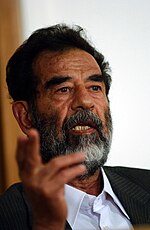World reacts to execution of Saddam Hussein
Monday, January 1, 2007
The execution of Saddam Hussein elicited critical statements by governments from around the world and also by non-governmental organisations.
The United States, Australia, Iran and some Polish politicians saw positive effects of the execution. George W. Bush said it was a "milestone" on the way to a democratic Iraq. Also, many Iranian politicians think that the execution was a "victory for the Iraqi people". The Polish foreign minister said he was an opponent of death penalty, but would make an exception in this case. Australian foreign minister Alexander Downer referred to the death of Saddam Hussein as an "important step" on the way towards a historical judgement of Hussein's "tyrannous regime". He thinks that it will lead to an opportunity to strengthen the process of reconciliation.
Other European countries were at odds with this response. These include the U.K., Finland, France, Switzerland, the Vatican and Germany, which stand for the worldwide abolition of the death penalty. The main reason given by them was that even incredibly heinous crimes do not justify execution. The Vatican's spokesperson, Federico Lombardi, said that there was "the risk that it would incite people to seek revenge and produce more violence". Germany's minister of state in the Office for Foreign Affairs, Erler, said that Saddam Hussein's crimes could not be doubted, but the German government would stay with its general attitude of rejecting death penalty.
Russia also expressed regret for the execution. An official of the Russian Office for Foreign Affairs, Michail Kamynin, warned against an intensification of the military and political situation in Iraq and against a rise of ethnical-confessional tensions. Libya ordered a three-day national mourning. Head of state Ghadhafi stopped all celebrations and ceremonies for the Eid al-Adha half-masting all flags on governmental buildings. The Palestinian foreign minister criticised the execution, too. There had often been disagreements, but nevertheless, the execution had been wrong, he said.
The organisation "Human Rights Watch" criticised the proceedings against Hussein as having "shown severe deficiencies". The World Council of Churches expressed its critical attitude towards the execution of Saddam Hussein: "Every time a person's life is taken it is part of a big tragedy." Amnesty international very much criticised the proceedings: the execution was apparently a foregone conclusion. The appeal court had only created the impression of legitimacy in flawed proceedings, they said.
The Council of Europe condemned the execution and called on Iraq to abolish the death penalty.
Meanwhile, at 4:00 a.m. this morning local time (1:00 a.m. (GMT)), the former leader's remains were buried in Awja, close to Tikrit, the home town of Hussein, as reported by CNN.
| |
This is a complete or partial translation of the article "Hinrichtung Saddam Husseins eint Kritiker der Todesstrafe", from the German language Wikinews, published under the Creative Commons Attribution 2.5 License. |
| This is a complete or partial translation of the article "Hinrichtung Saddam Husseins eint Kritiker der Todesstrafe", from the German language Wikinews, published under the Creative Commons Attribution 2.5 License. |
Related news
- "Saddam Hussein executed by hanging" — Wikinews, December 30, 2006
Sources
- Aneesh Raman, Arwa Damon, Ryan Chilcote, Sam Dagher, Jomana Karadsheh, and Ed Henry:. "Hussein buried in same cemetery as sons" — CNN, December 31, 2006
- Press Release by dpa:. "Saddams Tod eint weltweit Kritiker der Todesstrafe" — Businessportal24.com, December 30, 2006 (German)
- "Politik – International: Iraks Ex-Präsident Saddam Hussein hingerichtet – Zusammenfassung" — RIA Novosti, December 30, 2006 (German)
- "Reaktionen auf die Hinrichtung Saddam Husseins: Freude und Kritik" — Neue Zürcher Zeitung, December 30, 2006 (German)
- "Saddam-Hinrichtung: Internationale Reaktionen" — Tirol.com, December 30, 2006 (German)
- "Saddam Hussein hingerichtet" — Deutschland Radio, December 30, 2006 (German)
